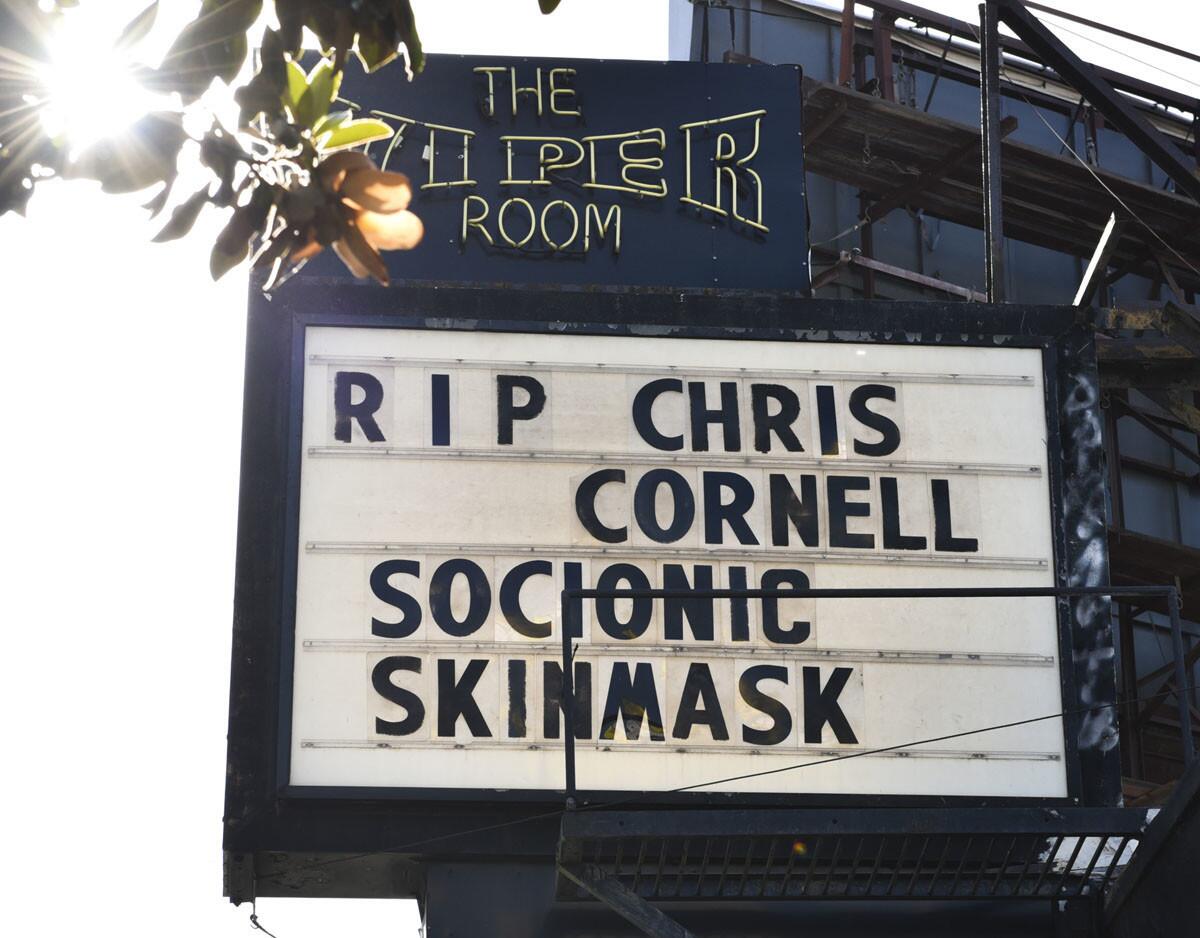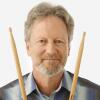Reflecting on loss of Soundgarden singer Chris Cornell

The music world is reacting with understandable shock over the Wednesday night death of Soundgarden/Audioslave singer and rhythm guitarist Chris Cornell, whose death at 52 is now being investigated as a “possible suicide” by Detroit police. On Thursday, his death was ruled a suicide by hanging by a medical examiner.
Cornell was in Detroit for a concert with the reunited Seattle band Soundgarden, whose drummer is San Diego native Matt Cameron. Regardless of the circumstances of his death, Cornell’s loss comes as a major shock and loss.
In an April 24 interview with Billboard, the veteran singer spoke enthusiastically about working on a new Soundgarden album, saying: “What I look forward to the most - because I tour so much, especially the last couple of years, by myself - is the camaraderie. It’s what we missed when we weren’t a band. When I do solo tours, I’m really kind of alone all the time, so that’s the best thing about it.”
Cornell, who wrote and sang the title track for the upcoming Christian Bale film, “The Promise,” was similarly thoughtful in his in-depth 1999 Union-Tribune interview.
At the time, though, he sounded happy to be launching his post-Soundgarden solo career, saying: “There’s a point where I got really irritated with band after band going for depressing themes, or aggressive themes, or ironic themes, just because it was considered cool.”
Here is the Union-Tribune’s 1999 Chris Cornell interview in full.
SOLO SAILER | Chris Cornell finds a move away from his Soundgarden roots ‘liberating’
The San Diego Union-Tribune, Dec. 2, 1999
Chris Cornell hasn’t undergone a recent religious conversion, but the former lead singer of Soundgarden has been born again.
At least he has musically, as the melodic, emotionally revealing pop-rock songs on his first solo album demonstrate.
That album, the carefully crafted “Euphoria Morning,” sounds almost nothing like Soundgarden, the pioneering Seattle quartet that helped spark the grunge-rock revolution of the early 1990s. And Cornell, who fronted Soundgarden from its inception in 1987 until its demise in 1996, couldn’t be happier with his new artistic lease on life.
“Everything that happened musically on this album, in its entirety, was my decision,” said Cornell, who performs Monday night at downtown’s Copley Symphony Hall.
“In a band, it’s a democratic situation where there will be a song or two that you wouldn’t have put on an album if it had been your choice alone. And that goes for everyone in the band; that’s what makes it a band. What makes this album different is that it’s entirely what I wanted, and that’s liberating.”
But flying solo for the first time without Soundgarden wasn’t easy, as the35-year-old Cornell is quick to concede.
“With a band, you look at a sound that you create together. And you have an idea of what that sound is, and write together. You have a perception to begin with,” he said, speaking from a recent tour stop in Cleveland.
“As a solo artist, not having created a character that is me apart from the band, it’s difficult to know what kinds of songs I should sing. That came from sitting in a room and writing a lot of songs, and finding what I was comfortable with. So I wrote several songs that didn’t make it on to my album, songs that were created in a period of experimentation.”
What this Seattle native is comfortable with on “Euphoria Morning” are shimmering, thoughtfully constructed songs. Most of them were written on acoustic guitar as vehicles to showcase Cornell’s surprisingly versatile singing.
His lyrics are as moody as ever in places. But his new songs showcase the range, flexibility and nuances of his voice in ways he could only imagine while in Soundgarden. And his album’s multilayered, sometimes baroque arrangements owe a considerable debt to The Beatles, circa 1969.
“Yeah, that was the first band I was really a huge fan of,” Cornell said of the perpetually Fab Four.
“I was 9 when I started listening to them, and it was probably my first period of realizing music would be really important to me as a listener.”
Where Soundgarden’s guitar-driven music was often dark and full of punk-ish Angst and heavy metal-tinged fury, “Euphoria Morning” is dramatically lighter and more understated. What results are such lovely songs as the melancholic “Preaching the End of the World” and the lilting “Can’t Change Me,” the album’s gem of an opening cut and its first single.
“From the beginning, I was sure it would throw some Soundgarden fans for a loop,” Cornell said of his move to a softer, more sophisticated musical realm. “Or that maybe they would already realize before they heard it that it would be different. And I’ve had that feeling before, having written songs (in a style) that Soundgarden wasn’t noted for.”
Such as the churning “Black Hole Sun,” from “Superunknown,” Soundgarden’s stylistically ambitious 1994 album?
“Sure,” replied the dark haired singer-guitarist, who also confirmed that his debut solo album is earning him new fans. “I already know that for a fact, just from people who have approached me after shows on my (solo) tour, or out on the street,” he said. “These people say to me: `I didn’t like Soundgarden, but I like this album.’ And that’s a victory in two ways.
“My career is continuing, and new people like it And some of them will buy Soundgarden records as well. So, in a sense, this might be a way for them to discover Soundgarden, which was a guitar-based and riff-based band, almost exclusively. This (solo) record has almost none of that. Although there’s a lot of guitar on it, it’s not a wall of sound.”
Pride in the past
Cornell is understandably proud of his work with his former group, which preceded Nirvana and Pearl Jam as the first Seattle band to make a major impact early in this decade. And he speaks fondly of his former Soundgarden band mates - lead guitarist Kim Thayil, bassist Ben Shepherd and erstwhile San Diego drummer Matt Cameron, who has since toured with Pearl Jam and also performs on “Euphoria Morning.”
“It’s very exciting when you’re really young and you suddenly realize you have a talent,” Cornell said. “And it’s exciting to also realize that, not only can you re-create other people’s music, but there’s a spark you get from doing your own.
“Starting Soundgarden was a very lucky break for me. And we were like-minded, in terms of our autonomy and putting our music before any other aspect - before sales, before marketing, before anything.
“The only real negative aspect is that when you concentrate so much on your autonomy, and what you do as an art form, you get used to that. And then when you get involved in the business side of that - promoting your album,which you spent a lot of time creating - you have to get involved with another aspect, which none of us was comfortable with. And that includes being a public persona, where you have to expose yourself.”
Cornell also found himself caught between Soundgarden’s quest to be widely heard and the alternative-rock scene’s initial (and sometimes hypocritical) rejection of fame and fortune.
“I definitely didn’t want to work really hard to create music I was proud of, and then have no one hear it,” he affirmed.
“I wanted people to buy our records. I wanted success that way, as long as I didn’t have to compromise the music or do anything I was uncomfortable with. But this was following a decade of commercial hard-rock that was ultimately really awful. And at the time, the only way to promote Soundgarden was to run it down the same path they’d run Ratt and Warrant and Whitesnake down.
“We were on the same magazine covers, radio shows and video programs, and we were approached by the media the same way they approached those bands. If someone considered me a hard-rock musician, then the fact that I was a fan of Elvis Costello, the Cure, Otis Redding and Aretha Franklin might have seemed strange.”
With those days of stylistic typecasting now behind him, Cornell is eager to follow his muse anywhere it might take him. And if it happens to be in a brighter, more optimistic direction, so be it.
“There’s a point where I got really irritated with band after band going for depressing themes, or aggressive themes, or ironic themes, just because it was considered cool,” he said. “I found myself taking certain chords and words out of songs, because I found it divisive (to use them). There are certain words now that everyone is using to attempt to be the most aggressive, or sociopathic or ironic.
“I don’t think there are too many young rock bands who are writing themes I haven’t thought of, or ironies I haven’t thought of. I don’t want to write down to anybody, basically. So I had to address subjects that were more introspective.
“Am I happy? Right now, I’m fairly content.
“But,” he added with a wry chuckle, “that’s just within this hour of this day.”
Twitter @georgevarga; george.varga@sduniontribune.com
Sign up for the Pacific Insider newsletter
You may occasionally receive promotional content from the Pacific San Diego.

